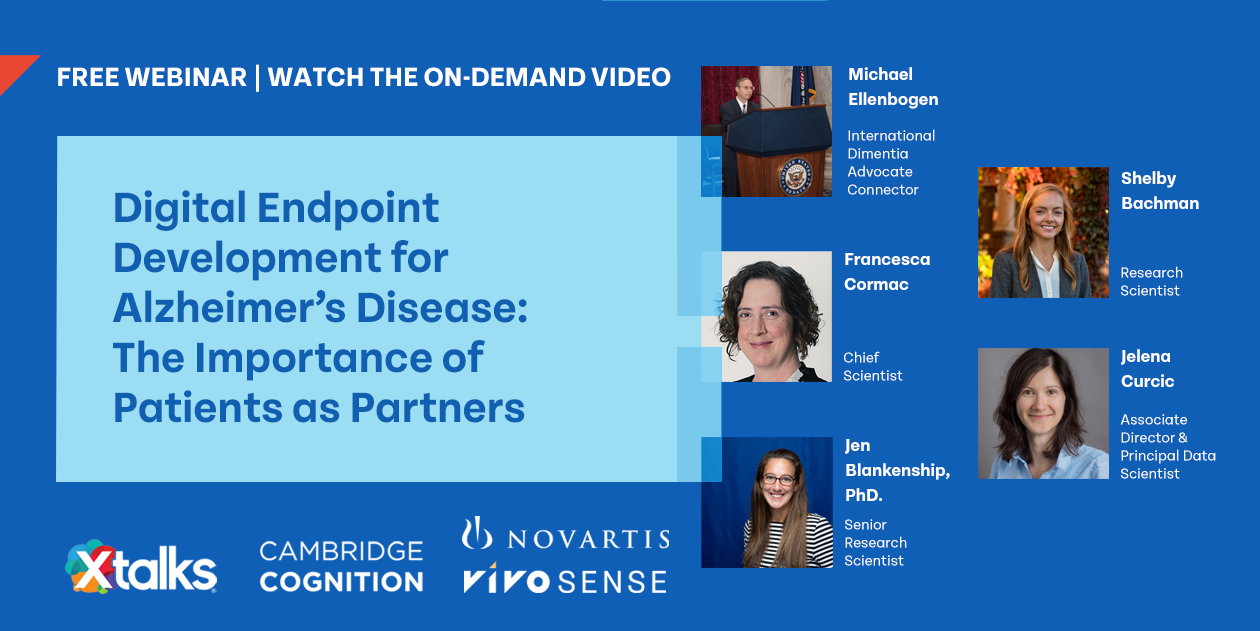Jen Blankenship, PhD, Senior Research Scientist, moderated a lively discussion with Shelby Bachman, PhD, Research Scientist, and an expert panel about the promise of Digital health technologies (DHTs) like smartphones and wearable sensors to advancing drug development and discovery in neurodegenerative diseases, particularly Alzheimer’s disease.
Through objective, continuous, remote capture of real-world outcomes, DHTs have the capacity to measure the impact of novel treatments on how patients with Alzheimer’s disease feel and function in their real-world environments, which, in turn, enables the development of drugs that improve aspects of health that matter most to patients. A digital endpoint derived from DHTs thus gives deeper insight on a patient’s health.
In this presentation, the featured speakers representing the perspectives of pharma, technology developers, and most importantly, patients discussed:
- • Challenges and shortcomings of clinical trials from the patient perspective
- • Approaches to better understand study participant burden through patient engagement groups
- • Frameworks to incorporate the patient perspective in outcome measure development
- • Areas for improvement
Watch the presentation today to understand how patient engagement can enhance digital endpoint development in Alzheimer’s disease clinical trials.
Expert Panelists
Shelby Bachman, PhD, Research Scientist, VivoSense

Shelby is a Research Scientist at VivoSense with expertise in neuroscience, gerontology, and statistics. She obtained a PhD in Gerontology during which she studied neural and physiological factors that contribute to successful aging. At VivoSense, Shelby uses data from wearable sensors to develop measures of real-world behavior that capture how patients feel and function.
Jelena Curcic, Associate Director & Senior Principal Data Scientist, Novartis Institutes for Biomedical Research (NIBR) / Biomarker Development

Dr. Jelena Curcic is a biomedical engineer working as a Senior Data Scientist at Novartis Institutes for Biomedical Research (NIBR) in Basel, Switzerland with the expertise in development, deployment and advanced analytics of digital biomarkers in Neuroscience. Her special topics of interest are using technology to measure cognition and neuropsychiatric symptoms in Alzheimer’s disease and mood disorders.
Francesca Cormac, Chief Scientist, Cambridge Cognition

Francesca is Chief Scientist at Cambridge Cognition. She has extensive experience of statistics, cognitive neuroscience and cognitive test development in a range of clinical populations. Since joining Cambridge Cognition in 2014, Francesca has worked to develop novel cognitive testing methodology to support high-frequency, near patient testing using digital technology, providing researchers and healthcare providers with unique insights into cognitive health. Francesca obtained a PhD in Dementia with Lewy Bodies at Newcastle University, followed by post-doctoral and academic positions at University College London and at the Medical Research Council in Cambridge. She maintains academic collaborations focused on neurological disorders, ageing and dementia.
Michael Ellenbogen, International Dementia Advocate & Connecter

Michael Ellenbogen was diagnosed with Young-Onset Alzheimer’s Disease at the age of 49. Prior to his diagnosis, he was a network operations manager for a Fortune 500 financial institution. Difficulty with work-related tasks eventually led to his early retirement. As a world-renowned International Dementia Advocate & Connecter, he has been featured in nationally syndicated TV, radio and other media outlets. He has written for blogs, newspapers, journals and websites and shared his personal perspective as a guest speaker. Michael served on the PA Alzheimer’s Disease Planning Committee and other advisory councils. He testified before the government, and has three letters published in the U.S. Congressional Record. He was a regular speaker at NAPA and was featured in the ADI’s 2012 World Alzheimer’s Report. He represented the U.S./World for people living with dementia at the World Health Organization in Geneva. He is interested in motivating those with Alzheimer’s to raise their voices and reduce the stigma surrounding the disease. Michael wrote about his journey with the disease in his book entitled “From the Corner Office to Alzheimer’s.”
Jen Blankenship, PhD
Jen Blankenship, PhD, is a clinical and translational scientist with a deep interest in wearable technology (e.g., continuous glucose monitors and accelerometers).

